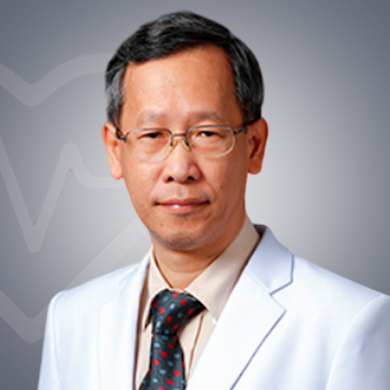
25 Years of experience
Speaks: English
A radiation oncologist is a specialist doctor who uses ionizing radiation for the treatment of cancer. A radiation oncologist might also use radiation to cure some benign diseases like benign tumors. These oncologists work closely with other doctors to plan the treatment of cancer patients. Some of the conditions the radiation oncologist Jedzada Maneechavakajorn treats are:
Radiation therapy is often preferred for the treatment of lung, head & neck, prostate, and breast cancer. Radiation therapy is used to treat breast cancer at every stage. It is an effective way to minimize the risk of breast cancer coming back after surgery. In addition, it is generally used to ease the symptoms of cancer that have affected other parts of the body.
Below are some symptoms of cancer which should be discussed an oncologist for proper diagnosis of the condition.:
Cancer can cause almost any type of sign or symptom. You might experience both signs and symptoms of cancer, which can show that there is some issue in your body. Recognizing these symptoms can help in an earlier diagnosis. When cancer tends to grow, it could push on cause signs and symptoms.
Dr Jedzada Maneechavakajorn works between 11 and 5 pm, Monday to Saturday. The doctor does not work on Sunday.
The below-listed popular procedures that Dr. Jedzada Maneechavakajorn performs are:
Proton Beam Therapy is the latest form of radiation therapy. This uses a high-energy proton beam for cancer treatment. It is a kind of particle therapy that offers targeted treatment, unlike any other radiation treatment. Proton Beam Therapy is effective for the treatment of cancers like skull base tumors, pediatric cancers, brain tumors, and prostate cancers.. CyberKnife is used for non-invasive treatment of cancerous and non-cancerous tumors. It is used to treat various cancers, such as brain, spine, prostate, lung, liver, pancreas, head, neck, and kidney. It is an alternative to surgery for patients having inoperable or surgically complex tumors.

Share Your Experience about Dr. Jedzada Maneechavakajorn

A radiation oncologist is a doctor who uses radiation for the treatment of cancer. Radiation oncologists may use radiation to treat certain benign diseases like benign (non-cancerous) tumors. Radiation oncologists also work with other physicians like surgical oncologists, medical oncologists, medicine subspecialists, and are a part of the cancer team. Radiation oncologists use a wide range of treatment methods, such as external beam radiotherapy, radioactive implantations, hyperthermia, and modality therapy such as radiotherapy with immunotherapy. surgery, and chemotherapy. They establish long-term relationships with patients and follow patients for years post-treatment.
Below are some tests that a radiation oncologist may recommend for the diagnosis of cancer:
A mammogram is the most common test for detecting breast cancer. Having mammograms regularly can lower the overall risk of mortality to breast cancer. It is easier to treat and before it is big enough to feel or cause symptoms.
Radiation oncologists are responsible for treating different types of cancer. If a person has been diagnosed with any of the following conditions, they should see a radiation oncologist:
You need to see a radiation oncologist if you have the below-listed symptoms: :